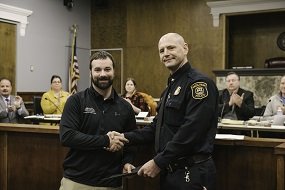Athletic Trainer Honored for ‘Life-Saving’ CPR

DETROIT – Four months after joining Henry Ford Health System, athletic trainer Eric Schwab is being credited with performing life-saving CPR on a high school hockey player two days after Christmas at a Hazel Park ice arena.
At the Hazel Park City Council meeting on Jan. 14, Schwab was honored with a civilian award from police chief Brian Buchholz. The police chief was joined at the presentation by a group of more than 10 police officers and firefighters who lined the back of the council chambers.
Buchholz described Schwab’s swift actions as “life-saving.”
“I feel extremely lucky to have been there,” Schwab says. “I don’t view it as anything spectacular. It’s my job to make sure the kids are safe. That’s what I’m supposed to be doing.”
Schwab is the head athletic trainer for U-D Jesuit High School, one of more than 20 metro Detroit high schools, colleges, universities and two Detroit professional sports teams supported by Henry Ford athletic trainers. The athletic trainers are licensed and certified health professionals skilled at diagnosing, treating, rehabilitating and preventing sports injuries.
The athletic trainers, who work closely with Henry Ford sports medicine physicians and physical medicine and rehab specialists, also have emergency life-saving training.
A Michigan native, Schwab joined Henry Ford on Sept. 9 after spending the first six years of his athletic training career in South Carolina and Tennessee. His wife Jamie is also a Henry Ford athletic trainer.
It was Schwab’s quick action that prevented a routine U-D Jesuit hockey team practice from turning tragic. The school uses the Hazel Park ice arena near 10 Mile Road and Dequindre for practices and home games. The team was nearing the end of practice at 4:30 p.m. on Friday, Dec. 27, when sophomore defenseman Conor Place collapsed on the ice during a drill.
Schwab skated to Place and found him unresponsive. “At first I thought he was having a seizure,” says Schwab. The situation intensified when Schwab couldn’t find a pulse. He then instructed the coaches to call 911 and called out for someone to locate the automated external defibrillator (AED) in the building and bring it to him. Before starting chest compressions, Schwab lifted Place’s jersey and undershirt over his head and used them to cushion his head on the ice.
CPR, or cardiopulmonary resuscitation, is a critical step in the American Heart Association’s Chain of Survival. Following the chain’s five steps can “improve the chances of survival and recovery,” the AHA says.
 Schwab readied the AED for use and administered one shock to Place’s chest as Hazel Park police, who had arrived on the scene, continued the chest compressions. An AED is a small portable device that delivers an electrical shock to help the heart regain an effective rhythm. Schwab says one shock restored Place’s pulse. By that time, EMS had arrived to transport Place to a local hospital for evaluation. “During the transport we got an update that he was alert and speaking,” Schwab says.
Schwab readied the AED for use and administered one shock to Place’s chest as Hazel Park police, who had arrived on the scene, continued the chest compressions. An AED is a small portable device that delivers an electrical shock to help the heart regain an effective rhythm. Schwab says one shock restored Place’s pulse. By that time, EMS had arrived to transport Place to a local hospital for evaluation. “During the transport we got an update that he was alert and speaking,” Schwab says.
“I believe that Eric’s quick action and training is directly responsible in helping Conor recover quickly, which contributed to Conor having a healthy future to come,” police chief Buchholz says.
Nikki Place, Conor’s mother, says she and her family are grateful to Schwab. “He saved my son’s life, literally,” she says. “My son wouldn’t be here without him.”
Mrs. Place says Conor is wearing an implantable cardioverter-defibrillator, or ICD, to monitor his heart rhythm and correct any arrhythmias that may occur. She says it’s unknown at this point what caused Conor to collapse. He is sidelined for the rest of the season.
As a CPR instructor, Schwab has taught many classes on what to do in an emergency. This was the first time, however, he had to apply his training in a real-life situation.
“I never thought I’d have to administer it on one on my athletes,” he says. “You always think of performing CPR on a referee or a coach or somebody in the stands, but not necessarily one of your own athletes.”
###
MEDIA CONTACT: David Olejarz / David.Olejarz@hfhs.org / 313.874.4094
.svg?iar=0&hash=F6049510E33E4E6D8196C26CCC0A64A4)

/hfh-logo-main--white.svg?iar=0&hash=ED491CBFADFB7670FAE94559C98D7798)









